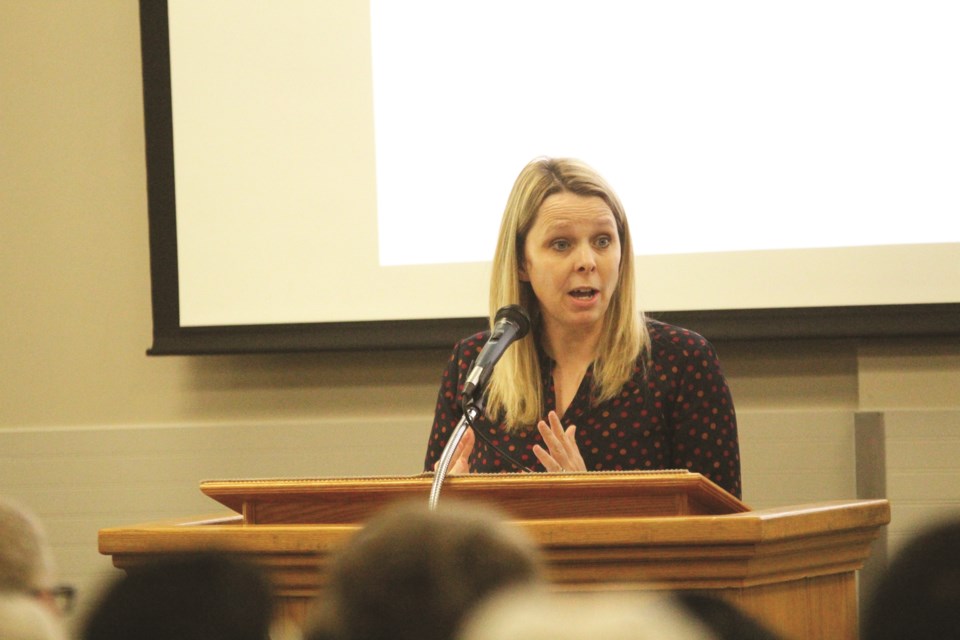A panel of Airdrie’s physicians and health care practitioners held an impassioned town hall meeting March 10 to address the provincial government’s recent cuts to the health care sector. The meeting, which was open to the public and attended by roughly 100 people, took place in the Rotary Room at the Genesis Place Recreation Centre.
The speakers, who all practice medicine in Airdrie or the surrounding communities, added their voices to the concerns physicians across Alberta have expressed about adjustments to primary care, billing changes and the province’s health insurance plan. Negotiations over a new master agreement between the United Conservative Party and the Alberta Medical Association broke down in February, before resuming in early March.
I’m covering the Airdrie Community Physicians Association’s town hall tonight at Genesis Place. There is a crowd here of a few dozen citizens and it should be starting momentarily. pic.twitter.com/DIcHzwkXVP
— Scott Strasser (@scottstrasser19) March 11, 2020
Dr. Tammy McKnight, one of the speakers at the event, said she was glad to see a full turnout.
“I think the people who were here were very engaged and interested in how their health care is going to change,” said McKnight, who has practiced medicine in Airdrie for 15 years and co-owns Airdrie Medical Clinic. “I’m hopeful that when they leave tonight, they’ll continue to spread the message to the community so it gets to the powers that be, so we can make the changes that allow us to continue to practice the way we need to, to look after the people of Airdrie.”
The government’s adjustments to the province’s health care sector, revealed in November 2019, include reducing the time modifier for appointment times at primary care clinics, no longer paying for senior drivers’ mandatory medical exams and reducing the stipend for on-call doctors in rural communities, among others.
The Ministry of Health has defended the cuts, stating the adjustments would bring Alberta’s health-care spending in line with other provinces. In 2017, Alberta spent the second-most per capita on healthcare in Canada, according to data from the Canadian Institute for Health Information – only Newfoundland and Labrador spent more.
The adjustments to physician’s billing and compensation – slated to come into effect April 1 – have drawn ire from doctors throughout Alberta, who warn the changes will impact the quality of care in the province.
“The impact of the changes on primary care is going to be a game-changer for us, and it’s not going to be a positive game-changer,” said Dr. Vitesh Sheopershad, a speaker at the event.
Rural physician Vitesh Sheopershad speaking about the impact of scrapping the rural on-call stipend. pic.twitter.com/hXgeFl3EUP
— Scott Strasser (@scottstrasser19) March 11, 2020
“We’re going to have to adapt, quite frankly, to give patients the best possible care we can under the constraints. I stand by my profession in saying we will still give patients the best possible care, but we’ll be practicing with one hand behind our back.”
Sheopershad, a physician at the Care First Medical Clinic in Airdrie, also spoke about his experiences working at Didsbury District Health Services urgent-care clinic and the difficulty of attracting doctors to rural communities.
“If you take away these clinical stipends as they are right now, family doctors with extra training would choose to leave, and replacing them would be an absolutely difficult task and it’s not going to happen any time soon,” he said. “I don’t think it’s reasonable to assume that, under this economic climate, a young [specialist] in a community who finds a better opportunity in B.C. won’t leave.”
A main concern shared by physicians is the reduction of time modifiers, which allows clinics to bill the province for longer appointments with patients. Sheopershad spoke about two recent cases of colon cancer he had diagnosed, saying being able to screen, spend more time with each patient and discuss more than one issue per visit led to the early detection of the disease.
“Imagine if I didn’t have time, that patient came to me three months later for one problem and I was focused on dealing with that one problem, six months later she comes in for something else and only when she starts talking about abdominal pain do I start thinking of colon cancer,” he said. “That’s the benefit of screening.”
Another speaker was Dr. Avneet Brar, who has worked at the Airdrie Urgent Care Centre since 2010. He said the proposed changes could ultimately result in longer wait times at hospitals and emergency rooms as more people forego visiting their family doctor for less-severe concerns.
“Good family doctors keep people on both sides of emergency rooms,” he said. “People will still have emergencies, heart attacks and reasons to be at urgent care. But, the way to take the burden off urgent care and reduce wait times is to have family doctors.”
Local MLAs Angela Pitt and Peter Guthrie, as well as health minister Tyler Shandro, were invited to the town hall but did not attend. Audience members said a March On Your MLA Day rally will take place on March 13, and will see participants depart Airdrie City Hall at 3 p.m. and walk to Pitt’s constituency office to deliver a letter outlining health care concerns and other issues.



